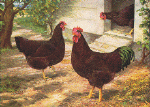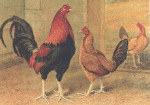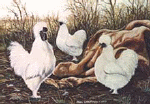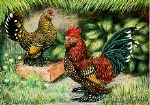Menu Putting the 'feather' in feathery friends The baby chick-Nature's miracle child Chicks or chocolate-it's an important choice The Pigeon- more than a park scavenger Bantams- mighty midgets of the poultry world A Christmas treat for true poultry lovers Choices, choices, choices Why DO people breed exhibition birds? Creepy crawly parasites- those undesirable hitch-hikers! |
Choices, choices, choices After a couple of months talking about pigeons, I think it's time we got back to the serious business of chickens. I get a lot of queries from people all over the world about what is the best breed to get for this or the best breed to get for that. Most people want their chickens to lay eggs, have babies and look good. I personally don't believe anything but a pure-bred (Americans call this Standard-bred or Bantam) fowl looks good, so if you think I will suggest a hybrid crossed laying bird to anyone, you will be sadly mistaken. So, gather your skirts ladies, hitch the belt men and let's go walking in the chicken yard! Before we choose a breed for you, let's take a look at a few things that need consideration. The first item on the agenda is... space. How much room do you have in your yard to keep chickens? Obviously, if you own acreage in the country, this is not an issue but most of us live in towns or cities which limit the room we have to pursue such activities. Limitations on space may determine whether you choose a large breed or go for something in the more petite bantam line.
As an aside, I once had a friend who managed to achieve exactly that goal. Let's call him, Bill. His neighbour complained long and hard against Bill keeping racing pigeons, even though they caused absolutely no grief to the neighbour. He complained to the authorities, he complained to other neighbours he complained, complained and complained. Eventually, Bill purchased a small flock of flying tumblers which can be trained to fly over the one spot for hours on end. He trained these birds to fly in circles above the neighbour's yard and on the days the neighbour hung out his washing, Bill would quietly release his pigeons, whereupon they would fly up about three hundred feet and begin circling. Now birds being birds, they were quite adept at um... let's just say they would make an airforce bomber pilot proud! Now the neighbour did not take kindly to having sticky white spots being spattered across his freshly washed laundry and he complained loudly to the authorities. The inspector who arrived to speak to my friend about the pigeons was a sympathetic man who spent most of his working week chasing frivolous complaints from temperamental neighbours. My friend insisted that he only kept racing pigeons that never flew in circles anyway and suggested that the birds causing the problem must be wild pigeons from the park. Now local council inspectors are not always well versed in the differences between racing pigeons and flying pigeons and being a kindly man who did not like chasing silly complaints anyway, made his report to say that Bill did not have pigeons that would do what the neighbour was claiming they were doing. And that was the official line the local council office took. Even after many more complaints and strident claims that these "wild" pigeons flew into my friend's shed each night could not sway the city council. The pigeons were deemed feral and therefore my friend could not be held accountable for their actions. In fact, they even went so far as to suggest that perhaps the neighbour was somehow encouraging "vermin" to the neighbourhood. After nearly six months of having his yard "bombed" by pigeons, the neighbour finally placed a "For Sale" sign on his front gate and vacated the premises, never to be seen again. My friend, being a wise man quickly introduced his new neighbour to the joys of pigeon keeping, those "wild" pigeons moved on to greener pastures and life for my friend settled down nicely. He never did take up my suggestion to raise "wild" pigeons and turn a profit out of his idea. He was just happy to be able to race his birds in peace. Less troublesome neighbours are often willing to give a situation a little time to get used to and these can be bribed (oh dear... did I say that?) with fresh eggs. Now I can tell you from personal experience that if your chickens aren't actually LAYING eggs at the time, you can sneak down to the local supermarket, buy some nice eggs of consistent size and colour and give the neighbours those. I bet they will lean over the fence at some opportune moment and congratulate you on the quality of the eggs your chickens lay. And I bet at least one of them will say they were the best eggs he/she has tasted since the farm eggs they ate as kids at their grandma's house! Now you might be saying that this is trickery and fraud, but let's face it, you DID give them something for free... and you didn't actually SAY your own chickens laid the eggs, did you? You just let them assume what they wanted to believe. And nine times out of ten, it will work to your favour and no-one will be hurt at all. You might even get the neighbours to tolerate a rooster or two!
To find out more about the different breeds, try your local library. Some hold books on poultry breeds and poultry keeping and these are often well worth the small overdue fine! The internet is another great place to hunt down information on chickens with many excellent sites popping up. I will put in a plug here for my own site of which I am justly proud! Okay, okay... my vanity stage has passed, let's get back to business. Once you have found some sources of information, you need to decide what you want most from your friends.
So there you are. Go on, get out of here... measure up your yard and work out the best place to set that little chicken coop. Start working on the neighbours, maybe even talk them into getting chickens too! But most of all, if you decide that chickens are for you, be kind to them, love them and they will give you years and years of pleasure (and fresh eggs for breakfast). |
 Town living also means [shudder]
neighbours... those people we either love or hate, who can make life a pleasure or a pain.
Some neighbours won't tolerate ANYTHING which means change in their lives and these folks
are quite likely to put pressure on you to not keep any chickens at all. Or keep a dog, or
a cat, or have children, or change your car... and some even prefer you didn't breathe!
You probably have only two choices with this kind of neighbour... move away or somehow
convince THEM to move away.
Town living also means [shudder]
neighbours... those people we either love or hate, who can make life a pleasure or a pain.
Some neighbours won't tolerate ANYTHING which means change in their lives and these folks
are quite likely to put pressure on you to not keep any chickens at all. Or keep a dog, or
a cat, or have children, or change your car... and some even prefer you didn't breathe!
You probably have only two choices with this kind of neighbour... move away or somehow
convince THEM to move away.  Enough about space and
neighbours. Let's get to the serious bit about choosing your own feathered beauties. One
quick way to get a good idea of what breeds of chickens are out there, is to find out if
your area has a local poultry club. Poultry clubs hold poultry shows with lots of
different breeds and colours of chickens in full size and in miniatures. If you are lucky
enough to find a poultry show, go along and ask the folks there lots of questions. Chicken
folks are mostly friendly folks who will be only too happy to answer your questions. And
most will have surplus birds for sale at some time during the year.
Enough about space and
neighbours. Let's get to the serious bit about choosing your own feathered beauties. One
quick way to get a good idea of what breeds of chickens are out there, is to find out if
your area has a local poultry club. Poultry clubs hold poultry shows with lots of
different breeds and colours of chickens in full size and in miniatures. If you are lucky
enough to find a poultry show, go along and ask the folks there lots of questions. Chicken
folks are mostly friendly folks who will be only too happy to answer your questions. And
most will have surplus birds for sale at some time during the year.  If you want eggs, eggs and more eggs you will most
likely have to go for a Light Breed. Breeds such as Hamburghs, Leghorns, Minorcas,
Andalusians and Spanish are typical of this type of fowl. They all lay tons of lovely
white eggs but they are also prone to being rather wild and flighty creatures who can fly
long distances and over backyard fences with impunity. You could clip their wings, but
that makes them easy prey for dogs and other predators. The other alternative is to
provide a covered area where they cannot fly out. Most Light Breeds have spectacular
colours and fine flowing style to their plumage. Given plenty of room, such fowls make a
splendid sight in any garden, tending to look rather like pheasants. Fine eggs laying
skills are not limited to Light Breeds however. Australorps, Langshans and Rhode Island
Reds are Heavy Breeds and they lay just fine. In fact, Australorps and Langshans
have won many laying competitions in Australia over the years. The best thing about this
type of fowl is that they do not fly very well and tend to be rather more sedate in their
behaviour. Other quality utility fowls of this type are Wyandottes, Barnevelders (which
lay HUGE, dark brown eggs) and Sussex. The Heavy Breeds are also handy if you want to grow
your own table fowls, but that takes a special kind of skill to be able to process the
chickens, which we won't go into here. So that covers eggs!
If you want eggs, eggs and more eggs you will most
likely have to go for a Light Breed. Breeds such as Hamburghs, Leghorns, Minorcas,
Andalusians and Spanish are typical of this type of fowl. They all lay tons of lovely
white eggs but they are also prone to being rather wild and flighty creatures who can fly
long distances and over backyard fences with impunity. You could clip their wings, but
that makes them easy prey for dogs and other predators. The other alternative is to
provide a covered area where they cannot fly out. Most Light Breeds have spectacular
colours and fine flowing style to their plumage. Given plenty of room, such fowls make a
splendid sight in any garden, tending to look rather like pheasants. Fine eggs laying
skills are not limited to Light Breeds however. Australorps, Langshans and Rhode Island
Reds are Heavy Breeds and they lay just fine. In fact, Australorps and Langshans
have won many laying competitions in Australia over the years. The best thing about this
type of fowl is that they do not fly very well and tend to be rather more sedate in their
behaviour. Other quality utility fowls of this type are Wyandottes, Barnevelders (which
lay HUGE, dark brown eggs) and Sussex. The Heavy Breeds are also handy if you want to grow
your own table fowls, but that takes a special kind of skill to be able to process the
chickens, which we won't go into here. So that covers eggs!  You may really get bitten by the chicken bug and
decide to join the fraternity of chicken show folk. Showing chickens is a strange hobby.
Nearly all other types of show animals return for their owners a tidy profit, but not
chickens. Very few chicken exhibitors make money from their birds, the real return is in
the challenge of breeding the perfect specimen and in the friendly rivalry on show day. It
is a hobby which calls to men and women of all social standing, income, race, colour and
creed. It is a gentle pursuit indulged in by people who place importance on fairness and
who appreciate the beauty of their featherd fowls. I have many friends all around
Australia, people who see each other seldom, but who always seem to remember that special
bird shown at such and such a place, ten years or more ago. Generally speaking, chicken
folks are nice folks!
You may really get bitten by the chicken bug and
decide to join the fraternity of chicken show folk. Showing chickens is a strange hobby.
Nearly all other types of show animals return for their owners a tidy profit, but not
chickens. Very few chicken exhibitors make money from their birds, the real return is in
the challenge of breeding the perfect specimen and in the friendly rivalry on show day. It
is a hobby which calls to men and women of all social standing, income, race, colour and
creed. It is a gentle pursuit indulged in by people who place importance on fairness and
who appreciate the beauty of their featherd fowls. I have many friends all around
Australia, people who see each other seldom, but who always seem to remember that special
bird shown at such and such a place, ten years or more ago. Generally speaking, chicken
folks are nice folks!  The final reason you may want to keep
chickens that we will discuss here, is beauty. You may just want to enjoy how they look in
your garden, how they peck and scratch and skirmish... how they can be enticed to your
feet with tiny pieces of bread or grain... how you can get them so quiet they will fly
onto your shoulder, or how your little bantam cock will find a tidbit and call his hens to
share the prize. Such simple delights are always on offer with a few chickens in your
garden and if you are lucky enough to be fortunate enough to be able to keep such birds,
one which never ceases to provide enjoyment. Chickens come in all shapes, sizes and
colours with something to please the fussiest person. They come with flowing tails, proud
headgear, some have feathers that look and feel like hair, some have feathered feet,
others not. They come big, small and in-between. Some have feathery pompoms on their
heads, some have hard feathers others have soft.
The final reason you may want to keep
chickens that we will discuss here, is beauty. You may just want to enjoy how they look in
your garden, how they peck and scratch and skirmish... how they can be enticed to your
feet with tiny pieces of bread or grain... how you can get them so quiet they will fly
onto your shoulder, or how your little bantam cock will find a tidbit and call his hens to
share the prize. Such simple delights are always on offer with a few chickens in your
garden and if you are lucky enough to be fortunate enough to be able to keep such birds,
one which never ceases to provide enjoyment. Chickens come in all shapes, sizes and
colours with something to please the fussiest person. They come with flowing tails, proud
headgear, some have feathers that look and feel like hair, some have feathered feet,
others not. They come big, small and in-between. Some have feathery pompoms on their
heads, some have hard feathers others have soft.